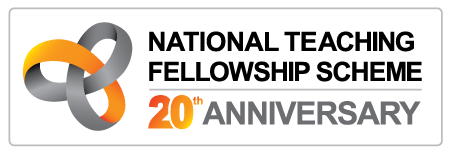Gaining recognition through the National Teaching Fellowship Scheme definitely had a positive impact on my career, especially as I worked in student support rather than as an academic.”Femi Bola
Do you remember how you felt when you found out you won the award back in 2008? What did the recognition mean to you?
I felt a real sense of achievement as a Black woman (there were not many at the time with a relatively senior role in HE) who had been recognised for her practice in a support service rather than an academic school. My confidence increased as a body external to my institution was confirming the excellence of my work.
What have been your main achievements since you won the award in 2008?
Being awarded an MBE in 2012 for services to diversity and achieving Principal Fellowship status in 2016.
How has becoming an NTF impacted on your career? Did it open any doors for you? How has it helped you to have a positive impact on your students/colleagues/institution?
I can’t say that becoming an NTF enabled me to progress in my institution, however, it did demonstrate to academic colleagues that excellent practice could be found in the services. My institution was very pleased when I received the award and promoted my achievement widely. I also got a very positive response from BAME students who sent me messages of congratulations and said that they were proud of my achievement. This made me realise the importance of having visible senior staff from BAME backgrounds to the student body.
What are you most proud of in your academic career?
Three things:
- Improving the reach of UEL’s Careers and Employability service from around 500 student interactions in 2005/06 to over 15,000 in 2015/2016.
- Presenting my paper, ‘I do and I understand’ – Developing employability skills through experiential learning, at the 6th conference of the International Society for the Scholarship of Teaching and Learning at the University of Indiana in the United States. I was really pleased with this international recognition of the pedagogy associated with the work of the support services.
- In 2008 setting up an award winning paid public relations training programme for BAME graduates in partnership with the communications executive search firm Taylor Bennett and Brunswick Communications to address the need for greater diversity in the public relations industry. Eleven years later the programme is still going strong with over 100 BAME alumni, of whom 14% now hold senior positions in the industry.
Who do you look up to most in your academic career?
Mike Thorne, the former Vice Chancellor of UEL who was brave enough to sanction my appointment to the role of Head Employability in 2004. Such a role was new to the sector at the time and my background was training and development rather than careers, so he took a chance on the unknown!
How do you think the sector has changed – good or bad – in the 11 years since you won an NTF award?
I think the sector is attracting more students from lower socio-economic groups and BAME backgrounds which is great. However, the majority of these students are in institutions with resource pressures and so they often do not receive the support they need to ensure they are able to make the best use of their degrees (investment) on graduation.
What role do you see the National Teaching Fellowship Scheme having in addressing the challenges faced by the sector?
As the Scheme promotes teaching excellence it should be helping address issues such as student retention, student satisfaction and the attainment gap as the very best teachers and support staff should be engaging and inspiring all students.
What, for you, encapsulates teaching excellence?
For me, teaching excellence in HE should ‘level the playing field’ not only equipping students academically but also developing their social and cultural capital so that they leave HE as confident individuals able to lead themselves, secure graduate level employment and make a positive contribution to society.
Away from academia, what do you like to do to relax and/or have fun?
I find entertaining family and friends fun, and gardening really fulfilling and relaxing.
Do you have any advice for this year’s cohort of winners as to how to maximise the impact of their award?
I think encouraging and supporting other members of staff to go for the award, especially those in the services and from underrepresented groups.

Applications for a National Teaching Fellowship 2020 close on Wednesday 18 March 2020. Institutions can nominate up to three individuals for the award. Find out more.
Share your #NTFSis20 story with us on Twitter and join the Advance HE Connect group especially for National Teaching Fellows.